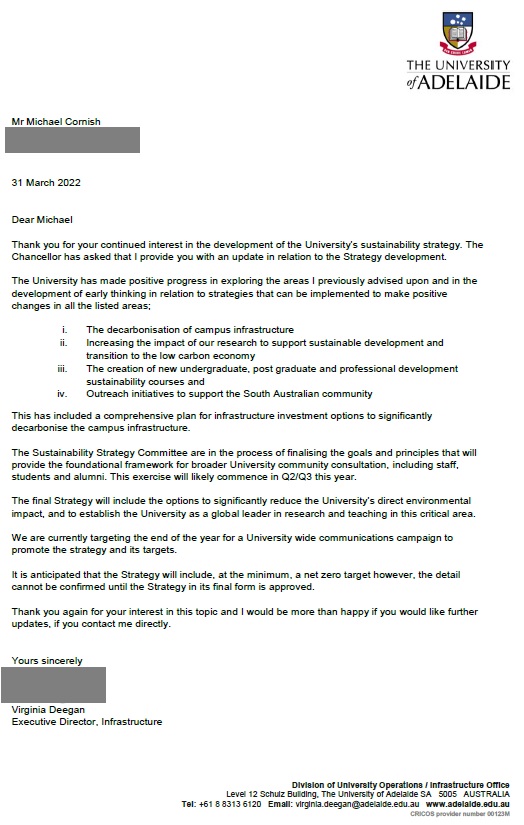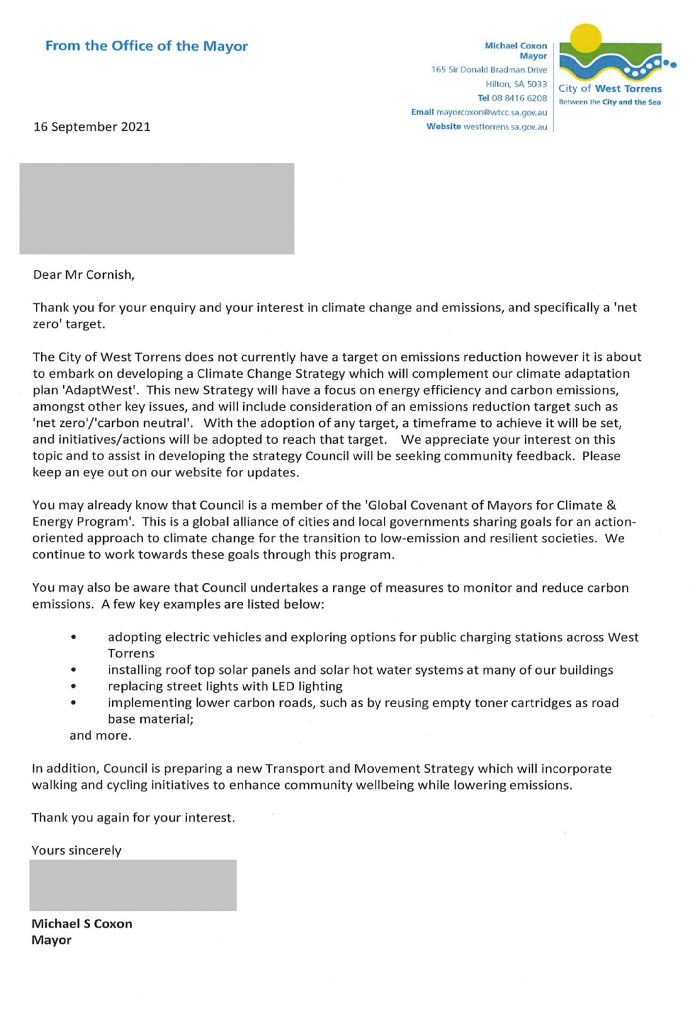Tag Archives: climate change
Vehicle emissions standards
The Hon Angus Taylor MP
Minister for Industry, Energy and Emissions Reduction
PO Box 6022
House of Representatives
CANBERRA, ACT 2600
Dear Minister,
Re: Vehicle Emission Standards
I write to you as a former Senior Adviser to the Federal Member for Mayo, Ms Rebekha Sharkie MP with a keen interest in public health and environmental issues.
Improving light and heavy vehicle emissions standards offer tremendous benefits:
- to the health of Australians by mitigating the noxious air pollution that leads to more than 1,700 premature deaths a year[1] via respiratory disease;
- to the environment by reducing CO2-equivalent greenhouse gas emissions; and
- by mitigating the negative health impacts that are consequential to climate change.
I recognise there are potential political obstacles to the introduction of more stringent heavy vehicle emissions standards, especially from the Government’s junior Coalition partner.
However – and without seeking to encourage inaction on heavy vehicle emission standards – progressing action on the emissions standards for light (passenger) vehicles presents an opportunity to the Coalition that tangibly demonstrates its commitment to public health and net zero emissions, and at much lower political risk.
As the Government’s Draft Regulatory Impact Statement (RIS), “Light Vehicle Emission Standards for Cleaner Air”[2] from October 2020 indicates [my highlights]:
“…there is a strong case for mandatory standards to reduce noxious emissions from road vehicles. The costs of air pollution from road vehicles are not borne directly by the vehicle manufacturers or by owners but are shared by the community. As such the problem cannot be addressed effectively by the operation of market forces alone as there is no commercial reason to do so. Government action to strengthen noxious emissions standards are internationally recognised as a very effective measure to reduce urban air pollution, and such standards have managed to deliver improvements in urban air quality despite growth in vehicle use.”
Further:
“Noxious emissions from road vehicles reduce urban air quality, leading to premature death and illness among Australians. …our current noxious emissions standards now trail most other developed countries including the EU, US, Canada, Japan and South Korea.”
The Draft RIS then proposes:
“…that the Government mandate Euro 6d for light vehicles for all newly approved models manufactured from 1 July 2027 and for all new vehicles manufactured from 1 July 2028.”
Indeed, I would highly recommend that the Federal Government fast-track the Euro 6d mandate for light vehicles, commencing the mandate much earlier than 2027-28 and within the next term of Government.
This commitment – and the framing its introduction within the next electoral term – would be a very useful concrete measure for the Prime Minister and Australian Government to deploy at the forthcoming Glasgow 2021 United Nations Climate Change Conference (COP26).
May I then kindly request – when will the Government make its decision about the introduction of more stringent light and heavy vehicle emissions standards, and what will be the likely timeframe for their commencement?
Will the Government be adopting the core proposal of the relevant Draft RIS, namely, adopting a Euro 6d mandate for light vehicle emissions standards?
I hope that the Government can see both the political opportunity this proposal presents, as well as the public health and environmental benefits it would create for our fellow Australians.
Yours sincerely,
Michael Cornish
15 / 10 / 2021
Cc Dr John Kunkel, Chief of Staff, PMO
[1] See: https://www.smh.com.au/national/our-dirty-fuel-is-a-bigger-killer-than-covid-19-how-australia-fails-on-car-emissions-20200909-p55tri.html
[2] See: https://www.infrastructure.gov.au/sites/default/files/migrated/vehicles/environment/forum/files/light-vehicle-emission-standards-for-cleaner-air.pdf
Update 1: City of West Torrens – Net zero emissions target
City of West Torrens – Net zero emissions target
Mayor Michael Coxon
City of West Torrens
165 Sir Donald Bradman Drive
Hilton SA 5033
Dear Mayor Coxon,
RE: City of West Torrens – Net zero emissions target
Thank you in advance for your time in considering my correspondence.
I write to you as a resident of the City of West Torrens who, like so many other residents, have deep concerns regarding how slowly Australia is responding to the threats posed by climate change and the lasting costs that this delay – let alone the delay of other countries – will have upon our local community, Australia, and the world.
I recognise that the Council’s role in this global issue is small, but its decision to act can still be important. Indeed, the Council is to be commended for all its work to date on mitigating and adapting to climate change.
However, I could not locate any evidence of a Council commitment to a net zero emissions target. It is widely understood that there will need to be a global net zero emissions target by at least 2050 – and ideally much sooner – if we are to stave off the very worst impacts from climate change.
May I kindly inquire, has the Council adopted a net zero emissions target, and if so, by what year has that target been set, and what plans have been adopted to reach that target?
If no target has been set, why not, and will you be pursuing the adoption of a net zero emissions target for the City of West Torrens as soon as possible?
Thank you again for your consideration of my correspondence.
Kind regards,
Mr Michael Cornish
30 / 8 / 21
Cc Chief Executive Officer, Mr Terry Buss PSM
University of Adelaide and a net zero emissions target
The Hon Catherine Branson AC QC
Chancellor
The University of Adelaide
SA 5005
Dear Chancellor,
RE: The University of Adelaide and a net-zero emissions target
I hope this correspondence finds you well; thank you in advance for your time and consideration. I am writing to you in your capacity as Chair of the University of Adelaide Council and would be appreciative if you were able to bring my correspondence to the attention of the Council.
I am writing in my personal capacity as an alumni and former staff member of The University of Adelaide. To avoid all doubt, I am not writing in any way in my capacity as a current employee within the Group of Eight directorate.
During my time as former Senior Adviser to Ms Rebekha Sharkie MP, an intellectual interest in climate change and environmental conservation has developed through greater understanding into an active and keen interest. It is through this lens that I seek to encourage the university to publicly adopt a clear emissions target – ideally, a minimum target of net zero (CO2 equivalent) emissions by 2030. I have searched unsuccessfully for any such commitment that the University may have made.
None of this is to detract from the very good work that The University of Adelaide has already undertaken to reduce its environmental footprint, such as its commitment as a Carbon Neutral Adelaide Partner, and work done under its sustainability engagement program, Ecoversity. These initiatives should rightfully be recognised as excellent steps in the right direction to ensure the university is doing its part in safeguarding Australian and global livelihoods and our shared environment.
However, other leading Australian peer universities have already made public announcements to net zero emissions targets, including the Australian National University (“below zero by 2030”[1]), The University of Sydney (“Net zero emissions by 2030”[2]), The University of Melbourne (“carbon neutral before 2030”[3]), and Monash University (“Net Zero emissions by 2030”[4]), to name but a few.
The University of Adelaide has an opportunity to position itself on climate change as ‘running with its peers’, although that opportunity may soon pass.
May I kindly request, is the University Council (or university administration) actively considering a net zero emission target?
If so, what is the likely timeline on a decision on that target?
If not, I kindly and strongly encourage the Council to actively deliberate on setting a net zero emissions target and set a deadline for that decision.
Thank you again for your time and consideration of my correspondence.
Yours sincerely,
Michael Cornish
25 / 6 / 2021
Cc Vice-Chancellor, Professor Peter Høj AC
[1] See: https://www.anu.edu.au/news/all-news/anu-zeroes-in-on-negative-carbon-emissions-by-2030
[2] See: https://www.sydney.edu.au/about-us/vision-and-values/sustainability.html#climatechange
[3] See: https://www.unimelb.edu.au/alumni/news/universitys-sustainability-plan-published

